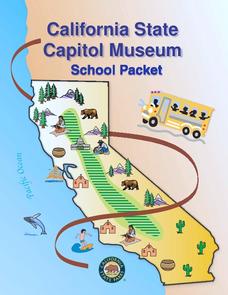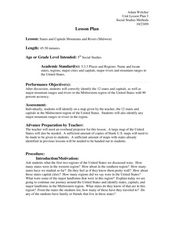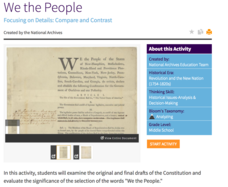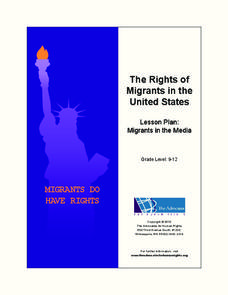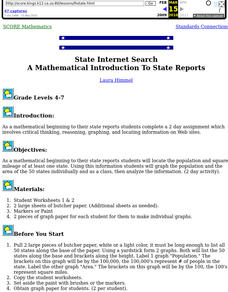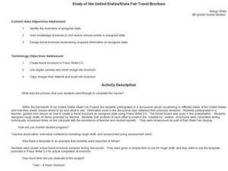Curated OER
Individual Rights
Students study the individual rights enshrined in the U.S. Constitution. They determine where these rights come from, and why we value them as we do. They consider that our individual rights are not absolute, and may be limited by other...
Curated OER
Rockin' Round New York State
Young scholars discuss their favorite rock groups and bands. They create rock groups that will be touring New York State. Students research cities in New York, determine dates of concerts, create touring itineraries, and develop...
Curated OER
Patriotic Symbols of the United States
Young historians take a close look at the most famous patriotic symbols of the United States and determine what they actually stand for. Symbols such as Uncle Sam, The Statue of Liberty, The Bald Eagle, and The Liberty Bell are studied....
Curated OER
States/capitals
Students identify the geographic locations of each state of the United States. Working cooperatively, they put togehter a giant puzzle of the United States using their individual pieces.
California State Parks
California State Capitol Museum School Packet
Here is great packet of worksheets to introduce your young learners to the general history of California and basic facts about the Golden State. Topics covered range from state counties, Sacramento, and the capitol to the...
Curated OER
Arkansas: A Natural State
Here is a wonderful lesson on natural resources found in Arkansas which is designed for kindergartners. The lesson could be easily adapted for any state. Some clever in-class activities, games, and a song are included in this...
Curated OER
all About the States
Students conduct Internet research about the states and use educational software to graphically organize the facts they have studied. As a class, students create posters and bulletin boards of the 50 states.
Curated OER
States and Capitals, Mountains and Rivers
Students identify geographical locations in the midwestern United States. For this geography lesson, students identify 12 states and capitals and geographical features in the region by using U.S. maps. Students use blank maps to fill in...
Curated OER
The United States Flag
Young scholars study the United States flag. In this American history and government lesson, students define and give examples of familiar symbols. Young scholars design a classroom flag. Students identify and describe the American flag.
Curated OER
Korematsu v. United States (1944)
Students examine equal protection. In this Supreme Court lesson plan, students examine primary documents from Korematsu v. United States and discuss the implications of the decision with regards to Japanese internment.
iCivics
You've Got Rights!
If aliens invaders nearly destroy the world in the distant future and leaders must decide on a pamphlet of protections to preserve individual rights, what should they include? Introduce the Bill of Rights and the struggle between the...
Advocates for Human Rights
Civic Engagement and U.S. Immigration Policy
To conclude their study of immigration and human rights, class members create a civic engagement project centered on an issue of immigration and designed to influence US immigration policy. They examine examples of attempts to influence...
US National Archives
We the People Focusing on Details: Compare and Contrast
Even the most inspiring documents in American history had to go through a few drafts before they were ready for publication. Reinforce the importance of the writing process, as well as the collaborative nature of democracy, with an...
Center for Learning in Action
Investigating Physical and Chemical Changes
Super scientists visit ten stations to predict, observe, and draw conclusions about the physical and chemical changes that occur when different states of matter—liquid, solid, and gas—are placed under a variety of conditions. To...
James Madison Memorial Fellowship Foundation
Those "Other Rights:" The Constitution and Slavery
Did the United States Constitution uphold the institution of slavery, or did it help to destroy it? Young historians study Article 4, Section 2, Clause 3 of the Constitution and evaluate the rights of slaveowners as they compared to or...
Advocates for Human Rights
Migrants in the Media
Class members examine two documents—The Universal Declaration of Human Rights and The Rights of Migrants in the United States—and then use reports in the media to assess how well the US is doing in ensuring these rights.
Museum of Tolerance
Disenfranchised People of the New Nation
Why are some immigrant groups in the United States embraced while others become disenfranchised? To answer this question, teams investigate why groups emigrated to the US, why some of these these peoples were disenfranchised, and their...
Smithsonian Institution
Water/Ways: The Poetry of Science
Water is the source of life. It appears in poetry in both peaceful and torrential descriptions; it appears in earth science in its liquid, gaseous, and solid states. Combine these interpretations of our planet's most precious and...
US Department of Commerce
Exploring Sampling Variability - Higher Education Attainment Across The United States
More education in statistics is always beneficial. Given cards that provide the proportion of adults with bachelor's degrees in 10 random US states, scholars individually determine the sample percentage of states in which more than 30...
Curated OER
Race and Crime in the United States: Are We Victims of Discrimination or Antiheroes?
Using methods adopted by Public Policy Analysts (PPA) class groups define a social problem, gather evidence to document the existence of the problem, identify causes, evaluate existing policies designed to deal with the problem, develop...
Curated OER
State Internet Search: A Mathematical Introduction To State Reports
Students locate the population and square mileage of at least one state. Using this information students graph the population and the area of the 50 states individually and as a class, then analyze the information.
Curated OER
Study of the United States/State Fair Travel Brochure
Fifth graders conduct research on different states of the United States. They develop and create a travel brochure on their assigned state.
Curated OER
The United States During World War II
Fourth graders comprehend what social and economics effect World War II on the home front of The United States, specifically in Texas. They are asked to react to rationing or a World War. Students complete the "Home Front: the United...
Curated OER
A House Divided: Slavery in the United States
Students explore the history of the United States and slavery. For this slavery lesson plan, students view primary sources, complete journal writing, view videos, and answer short answer questions.






